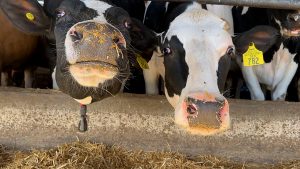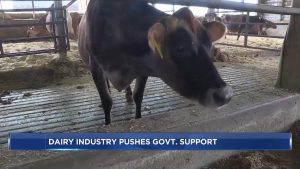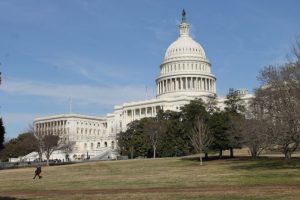
She is president of the Stevens County Farm Bureau and co-owner of Blue Point Dairy near Colville.
Julie and her husband, Bruce, a fourth-generation farmer, care for 120 cows and farm enough hay to feed their herd.
They are proud to be one of over 400 dairy farms in the state that make Washington among the top 10 milk producers in the U.S. The state gains $5.2 billion from the dairy industry each year.
There are 480 dairy farms in the state, according to the Washington Department of Agriculture
But times are growing tough for not only dairies but all farmers, Loveall warned.
“Every American farmer right now has a dozen glass plates that he’s tossing in the air every day and none of these plates can hit the ground,” she said. “Any of them that you let hit the ground can be the thing that puts you out of business.”
In addition to the fertilizer crisis, she said the cost of crude oil is at a seven-year high, up more than a dollar from a year ago, which will dramatically boost operation expenses.
Additionally, state and federal regulations have more farmers spending time on paperwork than in their fields, Loveall said.
It is no wonder, she said, that the U.S. Department of Agriculture reports that smaller family farms are declining by about 2% per year.
“Our food security is at higher risk than ever before,” she warned.
Loveall said the dairy industry took a big financial hit in 2020 when many states shut down schools and restaurants to stop the spread of COVID-19.
Then an extreme drought in 2021 drove up hay prices to unaffordable levels for many farmers, especially those who were younger and had taken out loans to establish an operation.
“The average age of a farmer in the U.S. today is 59 – so we need the younger generation to succeed,” she said.
The Lovealls have been in the business for more than 30 years, so their family has been able to ride out tough times in the past.
However, even the Lovealls are worried about the cataclysmic chain of events in 2022.
The World Bank reported a 66% increase in 2021 fertilizer prices and is forecasting prices to rise as high as 80% during the current growing season.
The cost of fertilizer is now outpacing crop prices, which means that farmers will plant less to keep expenses down, said Loveall.
She said there is also expected to be a severe shortage of fertilizer due to multiple disruptions in the supply chain.
Russia is the world’s biggest exporter of all major fertilizers, so sanctions are expected to create a vacuum in production. Russia produces high volumes of potash, a potassium fertilizer commonly used by farmers because it increases disease resistance and drought tolerance, and makes plant stems stronger.
Lovell said nitrogen supplies were already low before sanctions were imposed on Russia.
Natural gas is an input of this fertilizer and a sharp increase in its price last year shuttered many European plants. Nitrogen enables plants to capture sunlight energy by photosynthesis for more rapid growth and yield.
Loveall said China’s ban on exports of phosphate are also a problem for U.S. farmers. Major fertilizer companies in China are retaining supplies to ensure an adequate domestic supply. Their ban is expected to continue until at least June 2022. Phosphorus hastens food production by aiding in cell division and promoting root growth.
“Without fertilizers, we’re done,” said Loveall.
Crop yields without fertilizer will be too low for many farmers to cover the expenses of harvest, she said. Options are limited for farmers to raise prices to cover these expenses, because for the most part farmers are what economists refer to as “price takers.”
However, machinery and other farm equipment will be much higher is not subject to the same price limitations.
In the past several years, Loveall said the Washington Legislature has boosted minimum wage, mandated overtime pay for farmworkers, and established family leave and sick leave laws. All have made it more difficult for farmers to operate, let alone make a profit.
“It’s a good feeling for a lot of people to support these laws, but it’s not reality,” she said. “It’s fantasy and it doesn’t work on the ground.”
She said the clear disconnect between the 2% of the nation that grows food for 330 million people and beyond can be clearly seen in these policies.
Even worse, she said, are movements pushed by activists to give livestock the same rights as humans, or to force an American diet free of animals and their byproducts.
“We feed the world, this isn’t child’s play, this isn’t political bantering over a cup of coffee, this is serious stuff,” said Loveall.
It used to be that farmers were seen as rugged individualists who exemplified the American dream. However, increasingly they are viewed as a corrupt element society that needs to be brought under control, she said, and pushed back against this notion.
“The American farmer does more with less than any other country,” she said. “We are good stewards of the land because, if we weren’t, we wouldn’t stay in business.”
Loveall said state and federal legislators need to consider the economic consequences of damaging the nation’s agriculture base, if nothing else.
Agriculture feeds $9.5 billion into the state’s economy, according to the Washington Department of Agriculture.
The agency reports that Washington is the largest producer of red raspberries in the U.S. and is also a leading supplier of seed peas, apples and grapes.
“We need to turn things around,” said Loveall. “Food security is national security.”























